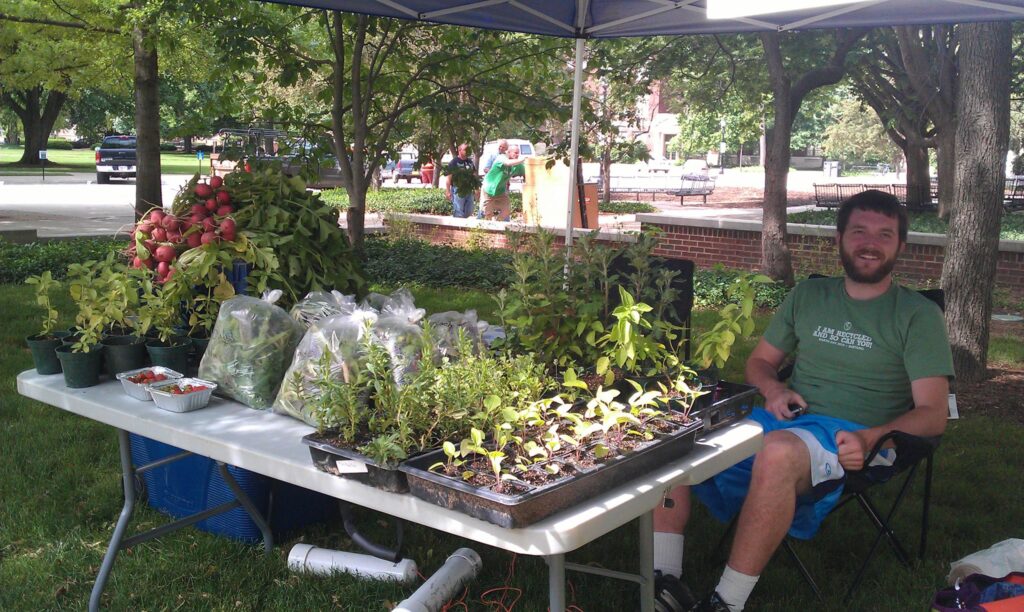
Find yourself a tin roof, a rain gauge and enjoy the smell of petrichor on the horizon – we’ve got a potential thunderstorm this morning! And I say now as many a farmer has said before me: we suuuuure needed it.
As a whole, it’s been a slower week, mostly harvest and maintenance. A classic case of no news is good news. However, for those curious: teardown of our varietal trial pepper tunnels is underway this week, as winterization continues. In our ongoing cover crop saga, sunnhemp termination is underway (if a little tangled in the flail mower), and we continue to brainstorm new uses for silage tarp and stale seed bedding in the spring. The Small Farms class was out at Meigs yesterday, and helped get a 20-bushel crate of Gold Rush apples picked. Our leeks are having a spot of corn seed maggot, which I’ll admit, is not ideal. And finally, Chris at long last remembered to put cilantro on the list for this week’s box. My deepest condolences to my fellow cilantro-soap-gene havers, our suffering is neverending, just like the ridicule I get from my coworkers for having bad taste buds.
Purdue Student Farm Spotlight: Ashley Adair
Hello! My name is Ashley Adair and I am the Extension Organic Agriculture Specialist at Purdue. I have been connected with the Purdue Student Farm for most of my adult life, starting with the summer of 2011 at the end of my freshman year here at Purdue. I had heard about the farm through a job ad from Steve Hallett, a professor in Botany and Plant Pathology at the time, and decided to give vegetable farming a try for my summer job that year. The Student Farm was a fledgling, grass roots-y place located west of campus, where the Provenance neighborhood is now. Looking south on Pathfinder Drive, you can still see the tops of the willow trees that line the back edge of the old farm site. For three summers during my undergraduate career at Purdue, I worked at the farm. I learned about Three Sisters plantings, conducted a soil survey, grew vegetables, ran the farmstand at the Purdue Farmers Market alongside my coworkers, practiced how to wrestle walk-behind tractors, raised chickens, worked with good people… I could go on! One particularly important person I met during that time was Chris Adair, fearless farm manager since 2016 and my spouse since 2017!

Me at the Student Farm harvesting mustard greens in one of the high tunnels, May 2013.

Chris working the Purdue Student Farm farmstand at the Purdue Farmers Market, May 2013.
Fast-forwarding to post-grad life and my career at Purdue Extension, I have continued working at the farm on various events and projects. For the first five years of my career, I was an Ag and Natural Resources extension educator in Montgomery County, IN. I got into drones, earned my Part 107 commercial pilot license, and decided to make a case study of taking aerial images of the student farm once every couple of weeks. Horticultural crops are underrepresented in drone work and I wanted to change that. The student farm aerial imagery project is on-going, and has served both as a visual recordkeeping system and as a planning tool. I also participated in the Small Farm Education Field Day throughout my tenure as a county educator. This habit of presenting at these field days has continued into the present in my current role as an extension specialist in organic agriculture. I have delivered sessions on cover cropping, equipment demonstration (wrestling BCSs, of course), dry edible beans, and open-pollinated corn.
This year was the second growing season for my open-pollinated corn demonstration, inspired by a desire to explore less well-known varieties with different flavors and cultural background than the hybrid corn grown on the majority of Indiana farm acres today. I focused on two varieties that performed well in 2023: Hopi Blue, a blue corn good for corn meal, and Early Pink, a short-season popcorn. The demo teaches students how to grow and shell open-pollinated corn, and helps farmers interested in growing a storage crop on their farms understand the basics of production. This year at the Small Farm Field Day, I explained how growing open-pollinated corn is different from growing hybrids, how to shell corn by hand, and how to test grain for mycotoxins that can be harmful to human health. Luckily, none of the open-pollinated corn from last year’s crop tested positive for aflatoxin, one of the most important mycotoxins. This year’s corn is yet to be shelled, but hopefully we’ll turn up the same result! I owe a huge thank you to Chris and this year’s summer crew for taking good care of the corn plots this year and last, and to the Small Farms Experience class for harvesting. My hope is that showcasing storage crops and unusual varieties can help farmers make sound decisions when it comes to diversifying their crops and markets.

Early Pink popcorn drying in the equipment shed at the Student Farm, fall 2024.

Me wrestling one of the farm’s BCSs to demonstrate roller crimping in buckwheat in July 2022.
While the Purdue Student Farm isn’t certified organic, it is a great place for students, farmers, and the public to learn about organic management practices. Chris and the interns use OMRI-listed (approved for certified organic) products, follow a 6 year crop rotation plan, utilize a variety of hand tools for weed control, and implement soil health practices (cover cropping, silage tarping for no-till weed control, etc.). All of this means it’s an awesome resource for folks of all kinds of backgrounds and skill levels! I’m grateful for the opportunity to use this space in my extension program and look forward to doing more work here in the future.